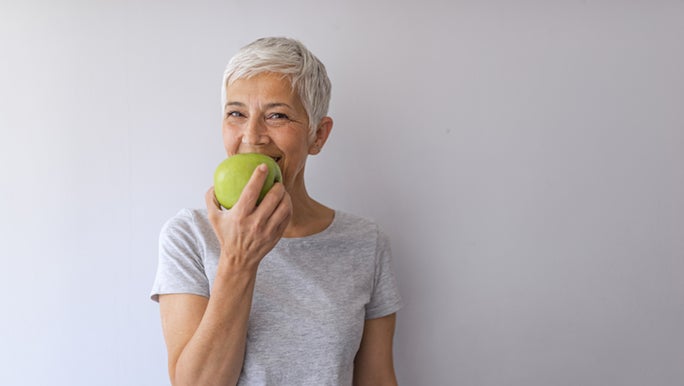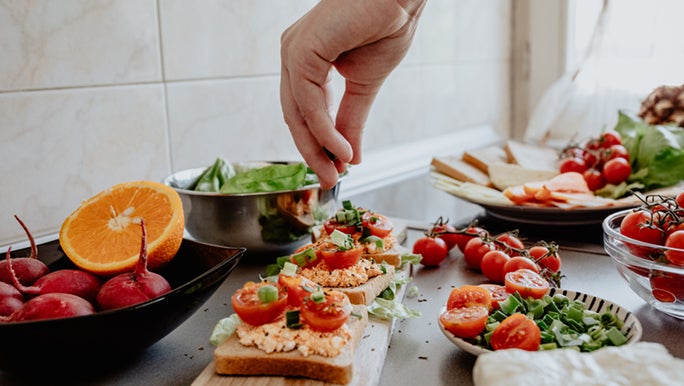We’re surrounded by messages that fad dieting is an easy way to get in shape. But before you listen to unqualified advice, do you really know what a fad diet is?
GPs and dietitians don’t often recommend fad diets because they can cause more harm than good.
We spoke to Accredited Dietitian Shivaun Conn about what a fad diet is and why you shouldn’t pay attention to them.
The definition of a fad diet
According to Sports Dietitians Australia, “A fad diet is a diet that makes promises of weight loss or other health advantages without backing by solid science.”
These unhealthy fad diets are known for encouraging people to restrict certain types of food. You’ll often find them promoting strange, unnecessary and expensive products.
Shivaun confirms that, “It does depend on the diet, but these fad diets often feed into a binary type of thinking. They’re known for causing a yo-yo effect on your diet and weight.”

A healthy weight looks different for everyone, so constantly focusing on weight loss is not the healthiest or happiest way to live.
How fad diet culture has led to a rise in eating disorders
Along with making you feel miserable, fad diets have been linked to an increase in eating disorders. They can encourage people to cut out food groups that are vital for good health.
Shivaun advises that dieting doesn’t create a healthy relationship with food. She says that, “Diets don’t actually address how you view food, and they’re often externally motivated. They’re not setting up your mindset for success.”
Crash diets – are they really dangerous?
Shivaun warns that fad diets can deprive you of nutrients and may lead to unwanted side effects.
Along with being harmful to your overall health, fad diets can jeopardise your goal of building muscle or improving your fitness. Without the right fuel, your body can’t repair muscles after a workout. So instead of gaining muscle, you risk losing it due to a calorie deficit.

Don’t get caught up looking at the number on the scales because it’s not the best guide for your overall health.
The 3 biggest fad diet myths busted
The simple fact is that some fad diets aren’t sustainable or safe. Any sudden weight loss that occurs when you start a fad diet is likely to return when you revert to your normal eating habits. This is why you should focus on your overall health instead of the number on the scales.
We spoke to Shivaun about the three biggest fad diet myths and why you should avoid them to live a healthier life.
Myth 1. All sugar is bad for you
Some promoters of fad diets push the myth that all sugar is bad for you.
But naturally occurring sugar in fruits, dairy, wholegrains, legumes and vegetables is okay. It’s only when you consume excessive amounts of added sugar that it becomes a problem.
So rather than jumping on a fad diet, try reducing highly refined sugary foods such as cakes, lollies, soft drink, and desserts to improve your health.
Myth 2. Fad diets are the easiest way to lose weight
You might think that fad diets make weight loss easy.
But fad diets can be hard, unpleasant and are likely to leave you feeling grumpy. If you really want to lose weight, focus on your long term health goal rather than a quick fix.
Eating healthier foods and exercising regularly can improve your mood, boost your energy and help you to maintain a healthy body weight.
Myth 3. All carbs are bad for you
You know those fad diets claiming all carbs are unhealthy? Don’t listen to them.
Carbohydrates are essential because they’re your body’s main energy source. The key is to know the difference between the source of a healthy and an unhealthy carb.
For example, mashed potatoes are a great healthy carb, but potato chips are an unhealthy carb. You can also choose whole grains over refined grains. This includes foods such as brown rice, oats and whole grain bread.
If you’ve experienced any symptoms of gluten intolerance, then you'll need to be careful about which grains you eat. Luckily, there are loads of gluten-free grain options available, such as corn or millet.

Eating healthier foods and exercising regularly will improve your mood, boost your energy and help you to maintain a healthy body weight.
Ditch the unhealthy fad diet culture
Now that Shivaun has explained why fad diets are an unhealthy weight loss strategy, it’s time to look at better ways to improve your health and fitness.
A healthy weight looks different for everyone, so constantly focusing on weight loss is not the healthiest or happiest way to live. Don’t get caught up looking at the number on the scales because it’s not the best guide for your overall health.
Instead, focus on how you can thrive, feel your best and be able to achieve what matters to you in life. Focus on permanent healthier changes that will help you to enjoy and get the best out of your life such as eating more plant-based foods, staying hydrated, moving your body, prioritising sleep, and taking time out to breathe and connect with what brings you joy.
A simple tool to provide insight into your shopping habits and inspiration to make healthier choices.
healthylife Food Tracker is a simple tool to help inspire you to make healthier food choices and achieve a more balanced diet.
If you suspect you may be struggling with an eating disorder, speak to your GP or talk to someone from the Butterfly Organisation on 1800 334 673.
Shivaun Conn is an Accredited Practising Dietitian, Accredited Nutritionist and Certified Health Coach with particular interests in nutrition, lifestyle, executive health and health behaviour change.
Reviewed by the healthylife Advisory Panel June 2021



